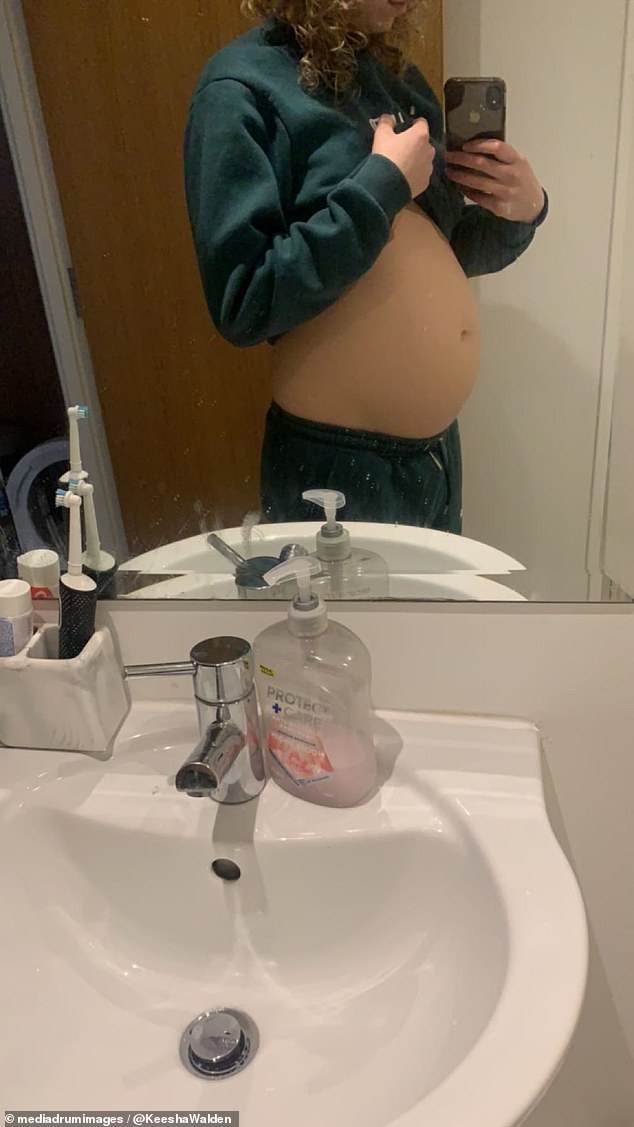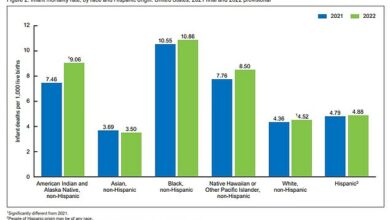Woman, 27, was told pelvic pain was ‘just part of being a woman’…in reality it was massive ovarian cancer that had spread to her lungs








A woman diagnosed with ovarian cancer claims doctors lied to her after dismissing her pelvic pain as ‘just being a woman’.
Keesha Walden of Norfolk experienced stabbing pain in her left side in early 2023, at age 26.
But in March, she began experiencing aching pains in her lower abdomen and irregular periods, yet she claimed her GP had told her to just watch what she ate and exercise.
It was only when her symptoms worsened that she was urgently referred to a gynaecologist in September for a cancer test, where they found what they thought was a cyst on her ovary.
A month later it was surgically removed and she was found to have a cancerous tumor measuring 26cm, about the size of a rugby ball.

Keesha Walden was experiencing severe pelvic pain, which was a hidden sign of a large ovarian cancer
Follow-up scans in February showed the cancer had spread, with a new mass in her pelvis and abnormal tissue on her lungs.
She was diagnosed with mucinous adenocarcinoma, a condition so rare that it accounts for only three percent of all ovarian cancer cases.
She spoke of her heartbreaking ordeal: ‘Because of the late diagnosis, I was told a hysterectomy was my only option for survival. They suspected the cancer was stage three, possibly stage four.’
‘They said all the tests were good and everything was fine, even though the GP had never seen me in real life. He said I had to watch my diet and exercise, because my BMI was perfect, but my waist size was very big.’
‘One of the most damaging ways doctors manipulated me was when they dismissed my symptoms over and over again, despite telling them how severe the pain and discomfort was.
‘This made me doubt my own experience and delayed the proper diagnosis and treatment I needed.’

The 27-year-old saleswoman showed a large swelling in her abdomen, another sign that an ovarian tumor is hiding in her pelvis.
She added: ‘I was told I was ‘too young’ to have a serious condition, especially something like ovarian cancer.
‘My concerns were dismissed and I was reassured that my symptoms were probably nothing to worry about due to my age. This assumption led to a significant delay.
‘There have been times when doctors suggested that my symptoms were the result of poor lifestyle, without considering other possibilities.
‘They told me to just eat better, exercise more or relax. That made me feel responsible for my own suffering and they couldn’t go deeper into the real cause.
“One of the most disheartening examples of gaslighting I’ve experienced was when I asked my doctor about my five-year survival rate.
She responded dismissively, saying, “They’re just numbers,” as if my concerns were irrelevant or silly.
When I asked for more information, she vaguely assured me that she was “pretty sure” I would be fired within five years, but she didn’t provide any further clarification.
‘Her inability to provide a concrete answer, combined with her dismissive attitude, made me feel stupid for asking the question in the first place.
She concluded her speech by saying, “Sometimes doctors don’t have all the answers.”
“That made me even more anxious because it seemed like she was downplaying the seriousness of my concerns.”
Ovarian cancer is the sixth most common cancer in the UK.

Mrs. Walden had to undergo major surgery to remove the cancer, which involved the removal of several organs in her pelvis.
The disease kills an average of 11 women a day in Britain, or 4,000 a year.
Figures show the disease kills three times as many women each year in the US.
Often the diagnosis is made late because the symptoms are vague. Examples include indigestion, pelvic or abdominal pain, loss of appetite, constipation and increased urination.
About 93 percent of women diagnosed at the earliest possible stage live for five years or longer when diagnosed. Only 13 percent of women are diagnosed at stage four.
Stage three means that the cancer has spread outside the pelvis into the abdominal cavity or into the lymph nodes.
About one-fifth of women with ovarian cancer are also diagnosed in the emergency department, often when it is too late for treatment.
In March, Mrs. Walden underwent a total abdominal hysterectomy, which involved the removal of both ovaries, both fallopian tubes, her uterus, appendix, cervix, 26 lymph nodes and the omentum.
She said: ‘I am still undergoing chemotherapy at the moment and I am hoping my last cycle will be on September 6.

She was diagnosed with mucinous adenocarcinoma, so rare that it accounts for only three percent of all ovarian cancer cases

Ms Walden said: ‘Cancer and chemotherapy have had a huge impact on my confidence and self-esteem as a woman. The physical changes that come with the treatment, hair loss, weight fluctuations and the visible toll on my body and the large scars have been hard to accept.’
‘After that, I will be monitored for five years to see if the nodules in my lungs change and to make sure there are no other signs of recurring disease.
‘The uncertainty of my situation makes it difficult for me to imagine what my future will look like.
‘At 27, most people are focused on building their lives: buying a house, settling down and starting a family.
“Unfortunately, all of that has been taken away from me. My new reality is about finding peace with the unknown.”
She added: ‘Cancer and chemotherapy have had a huge impact on my confidence and self-esteem as a woman.
‘The physical changes that the treatment brings, hair loss, weight fluctuations and the visible effects on my body and the large scars, were difficult to accept.
‘These changes have often left me feeling disconnected from the person I once was. I struggle to recognize myself in the mirror.’
According to the NHS, the late diagnoses were attributed to staff shortages and workload.
“There is widespread misunderstanding about current outcomes reporting processes and the role of the cancer center,” they added.
‘There is no effective failsafe in gynecology to highlight abnormal results. This is a trust-wide issue.’
Mrs Walden said: ‘This experience has changed me irrevocably. Although I hope to find peace, the uncertainty of whether I will have another five years to live adds to the emotional turmoil.

Now Ms. Walden is urging others to demand answers from their doctors and not give up on getting a diagnosis

Ovarian cancer is a rare form of the disease that develops in the ovaries, the female organs that produce eggs. It is often called a “silent killer” because symptoms only appear in the late stages of the disease.
‘Everyone couldn’t believe this could happen to me at such a young age’
‘There was anger that it hadn’t been discovered earlier, especially as I had been struggling with my health for so long and had been wrongly reassured all the time.
‘It was a crazy and overwhelming time for me and my family. The delay in the results meant that everything suddenly became urgent – there was no time to pause and process what was happening.
“It felt surreal and scary for all of us.”
Ms Walden is now calling on others to demand answers from their doctors and not give up on getting a diagnosis.
‘I still have lumps in my lung that have not been investigated. The hospital is not planning to do a biopsy because they are apparently too small (five millimeters) and so they still cannot confirm whether it is cancer or not.
‘But my confidence in the NHS is now zero, given the wrong diagnosis and the delay in results.
“For anyone dealing with the challenges of cancer and chemotherapy, I know this journey can be overwhelming, but remember that you are stronger than you think,” said Keesha.
‘Every day you fight is a testament to your resilience and courage.
‘Your worth is not determined by the changes in your body or the challenges you face, but by the incredible strength you show in dealing with them.
‘Always listen to your body, if you think something is wrong, make sure you follow through and follow through. I regret not being more persistent in getting a diagnosis.’




